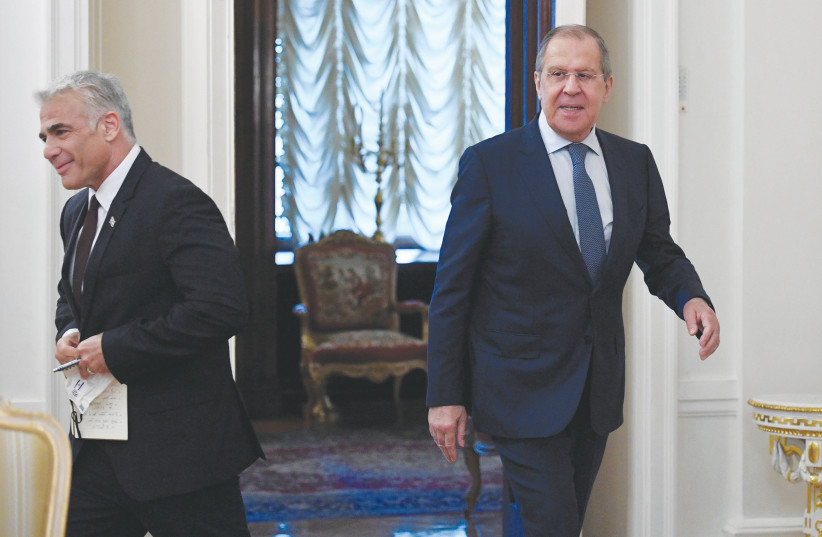Russian President Vladimir Putin apologized to Prime Minister Naftali Bennett for Russian Foreign Minister Sergey Lavrov’s remarks that Hitler had Jewish blood, the Prime Minister’s Office said on Thursday.
During the call in honor of Israel’s 74th Independence Day, “the Prime Minister accepted President Putin’s apology for Lavrov’s remarks and thanked him for clarifying his attitude towards the Jewish people and the memory of the Holocaust,” according to the PMO.
The Russian readout did not mention an apology from Putin, but said that the two leaders discussed the Red Army’s role in defeating the Nazis, ahead of Victory Day on May 9. Putin also sent well-wishes to Red Army veterans in Israel.
Bennett resumed, to some extent, his role as a mediator between Russia and Ukraine, with the Putin call coming the day after he spoke with Ukrainian President Volodymyr Zelensky. Following that conversation, Zelensky tweeted that he and Bennett talked about “countering the aggressor and about the critical situation in Mariupol.”
The prime minister asked Putin to examine a humanitarian corridor from Azovstal in Mariupol, Ukraine.

The Israeli and Russian statements said that Putin would allow the safe evacuation of civilians with the help of the UN and Red Cross.
Lavrov sparked a dispute with Israel with remarks on the Holocaust and antisemitism.
Asked how Russia can be fighting a war of “denazification” when Ukrainian President Volodymyr Zelensky is Jewish, Lavrov said: “When they say ‘What sort of denazification is this if we are Jews,’ well, I think that Hitler also had Jewish origins, so it means nothing.”
“For a long time now, we’ve been hearing the wise Jewish people say that the biggest antisemites are the Jews themselves,” Lavrov told Italy’s Rete4.
Bennett and Foreign Minister Yair Lapid decried Lavrov’s “unforgivable” remarks as blaming the Jews for the Holocaust, and the Foreign Ministry summoned Russian Ambassador to Israel Anatoly Viktorov.
The following day, the Russian Foreign Ministry said “the current Israeli government supports the neo-Nazi regime in Kyiv.” Moscow also mentioned “cooperation between Jews and Nazis” such as “Judenrats” – Jewish councils that reported to the Nazis – were far from an uncommon occurrence.
Zelensky called Lavrov’s remarks “scandalous and completely unacceptable” when they spoke on Thursday morning.
Ukrainian Foreign Minister Dmytro Kuleba condemned “Lavrov’s antisemitic remarks” in a tweet on Thursday.
“I emphasized that antisemitism has a long track record among Russian elites,” he wrote. “The only way out for FM Lavrov is to publicly apologize before Jews around the world. Antisemitism cannot be tolerated.”
Kuleba and Lapid spoke on Wednesday, congratulating Israel for Independence Day. He also thanked Lapid for standing with Ukraine and for the humanitarian aid Israel has provided.
Lapid said Israel is also willing to help Ukraine rebuild after the war.
Russian Foreign Ministry spokeswoman Maria Zakharova said Israelis are fighting with Azov, a Ukrainian military battalion with neo-Nazi roots.
“I’ll say something that the politicians in Israel who are now inflating their information campaign are unlikely to want to hear,” Zakharova said in an interview with Sputnik Radio on Wednesday. “Perhaps they will be interested. In Ukraine, Israeli mercenaries are actually shoulder-to-shoulder with the Azov militants.”
The Israeli Foreign Ministry declined to comment.
Last week, a video of what appeared to be Israelis fighting for Ukraine appeared on social media.
Speaking in accented Hebrew, a soldier thanked “the government of Israel for helping us while we fight against the Russians.” They also thanked Ukrainian Rabbi Moshe Asman and wished people a happy Passover.
Further details about the soldiers remained unknown.
About 2,000 Israelis remain in Ukraine, most of whom are Israeli-Ukrainian dual citizens, the Israeli Foreign Ministry said.
Last week, a Kremlin-linked channel on the Telegram social media app accused 10 Israelis who had worked on the Ukraine-Poland border of being mercenaries, publishing their names and passport details. The list was mostly made up of Israeli diplomats and embassy security, and included Rishon Lezion Deputy Mayor Maksim Babitzky, who led a humanitarian aid delegation to the border in early March.
The Azov Battalion of Ukraine’s National Guard grew out of a neo-Nazi group and still has extremist leadership and members. Azov uses the Wolfsangel insignia used by Waffen-SS and Wehrmacht divisions during World War II.
Azov has been the centerpiece of Russia’s efforts to paint Ukraine as a country in need of “denazification.” It has roughly 1,000 members, while there were 245,000 active Ukrainian military personnel at the outset of the war with Russia this year, and millions of adult males were required to remain in the country to help in the war effort.
There are members of the Azov Battalion of all backgrounds, including Jewish Ukrainians, and the group has tried to recruit foreign members.
Azov has been seen using the Israeli-developed MATADOR anti-armor platform, donated by Germany, where it was produced.
Ukraine’s military claims that 20,000 foreigners from 52 countries applied to join its foreign fighters unit. Ukraine’s embassy in Israel invited Israelis to volunteer, but removed the Facebook post soon after.
Russia has said it would not treat “foreign mercenaries” as lawful combatants and would deny them their rights under international humanitarian law.
Mike Starr and Jerusalem Post Staff contributed to this report.
